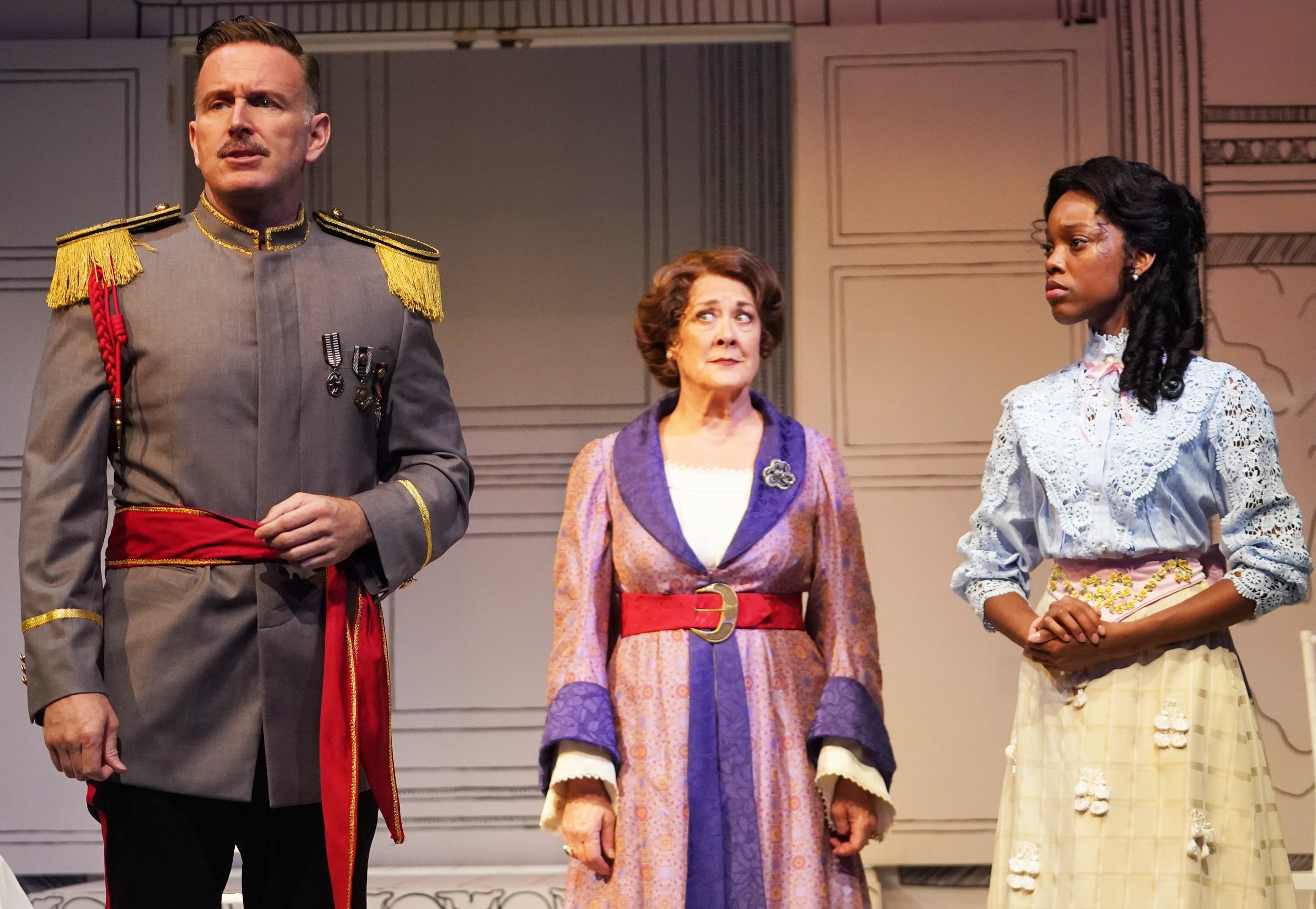Ben Davis as Major Sergius Saranoff, Karen Ziemba as Catherine Petkoff, and Shanel Bailey as Raina Petkoff in the Gingold Theatre Group’s presentation of George Bernard Shaw’s 1894 comedy Arms and the Man.
Gingold Theatrical Group (GTG) is back at Theatre Row with Bernard Shaw’s 1894 comedy Arms and the Man, directed by David Staller. In the 17 years since its founding, GTG has presented all 65 of Shaw’s plays in full productions or staged readings at least once (generally with élan), and Staller has become our nation’s foremost Shavian outside academia.
Shaw got a late start at playwriting after trying his hand at novels (largely unsuccessful), criticism (much of it inspired), and lectures advocating the Fabian Society’s brand of socialism. Arms and the Man, his first spectacular stage success, is a pastiche of 19th-century romance; it’s low on drama but well-stocked with repartee (though the wit here is inferior to that in masterpieces such as Pygmalion or Man and Superman). The script is mechanically plotted, with creaky farcical tropes in abundance, but it has proved diverting to generations of audiences.
Captain Bluntschli (Keshav Moodliar), the intruding Shavian anti-hero, pleads with Raina to hide him from his pursuers.
Arms and the Man takes place during a 14-day war between the Kingdom of Serbia and the Principality of Bulgaria. That brief 1885 conflict involved border disputes and the Serbs’ appetite for Bulgarian land. The play’s action occurs in and around the home of Paul Petkoff (Thomas Jay Ryan), his wife Catherine (Karen Ziemba), and their daughter Raina (Shanel Bailey). Rough-edged Major Petkoff is convinced his family represents the cream of Bulgarian aristocracy and prides himself on their house, which has a library (perhaps the only one in Bulgaria), a staircase (also a rarity), and an electric bell (a nifty new device for summoning servants without bellowing). Raina puts her father’s haughty airs in context: “Bulgarians of really good standing—people in our position—wash their hands nearly every day.”
Raina is engaged to Major Sergius Saranoff (Ben Davis), hero of the Battle of Slivnitza, where the Bulgarians gained the upper hand over the Serbs who initiated the war. Raina declares that her “relation to [Sergius] is the one really noble and beautiful part of my life.” Raina’s high regard for Sergius and his Byronic notion that war is glamorous are challenged by Captain Bluntschli (Keshav Moodliar), a Swiss citizen fighting for the Serbs who shimmies up a drain pipe and barges into her bedroom searching for shelter. Having gone to war with his cartridge boxes full of chocolate creams, Bluntschli has no ammunition and is abjectly vulnerable to his Bulgarian pursuers. Raina dubs him the chocolate-cream soldier and agrees to hide him.
“Davis and Moodliar are able foils, each finding humanity in a character who could easily be rendered as caricature. ”
Shaw took the play’s title from the opening line of Virgil’s Aeneid (“Arms and the man I sing,” as translated by John Dryden). Bluntschli, Shaw’s anti-hero, is neither an epic hero like Aeneas nor a Napoleon-inspired poseur like Sergius. He’s a pragmatic mercenary soldier who was eyewitness to Sergius’s ineptitude and folly at Slivnitza, and he’s qualified by experience to testify that “there are only two sorts of soldiers: old ones and young ones.”
Davis and Moodliar are able foils, each finding humanity in a character who could easily be rendered as caricature. Davis embodies Sergius’s comic pomposity while lending verisimilitude to the character’s flagrant hypocrisy. Moodliar finds more nuance in Bluntschli than anyone could expect. His low-key, high-comedy performance is likely to linger in the playgoer’s mind, along with Shaw’s anti-heroic message, long after the final curtain.
Major Paul Petkoff (Thomas Jay Ryan) and Sergius reminisce about the Serbo-Bulgarian War from which they’ve just returned. Photographs by Carol Rosegg.
As the play’s official ingenue, Bailey is poised and suitably appealing, but Delphi Borich has the juicier, if briefer, role of Louka, an iron-willed housemaid competing with Raina for Sergius’s affection. Louka is this comedy’s representative of the self-reliant “New Woman,” a concept Shaw championed throughout his playwriting career. With exquisite timing, a light comic touch, and an irrepressible twinkle in her eyes, Borich makes Louka the best bad girl imaginable. Ziemba, an imposing Mrs. Warren in GTG’s Mrs. Warren’s Profession two years ago, has less to do this time around but wrings maximal comedy from her role. GTG is fortunate to have her as its unofficial doyenne.
A crackerjack design team fills the tiny Theatre Row auditorium with color, whimsical style, and melodies that evoke romanticized accounts of the so-called Gay ’90s. (The sound design utilizes zippy period compositions performed by the Paragon Ragtime Orchestra.) In an autumn of unrelenting dark news about world affairs, Arms and the Man is timely as well as engaging. Almost 130 years after its premiere, this old Shavian chestnut sings of arms and humankind to playgoers facing the possibility of new and expanding wars on multiple continents.
GTG’s production of Arms and the Man runs through Nov. 18 at Theatre Row (410 W. 42nd St.). Evening performances are at 7 p.m. Tuesday through Thursday and at 8 p.m. Friday and Saturday; matinees are at 2 p.m. Saturday and 3 p.m. Sunday. For tickets, visit tinyurl.com/ARMS2023 or the Theatre Row box office; for information, call (212) 355-7823 or visit gingoldgroup.org.
Playwright: George Bernard Shaw
Direction: David Staller
Sets: Lindsay G. Fuori
Lighting: Jamie Roderick
Costumes: Tracy Christensen
Sound: Julian Evans





